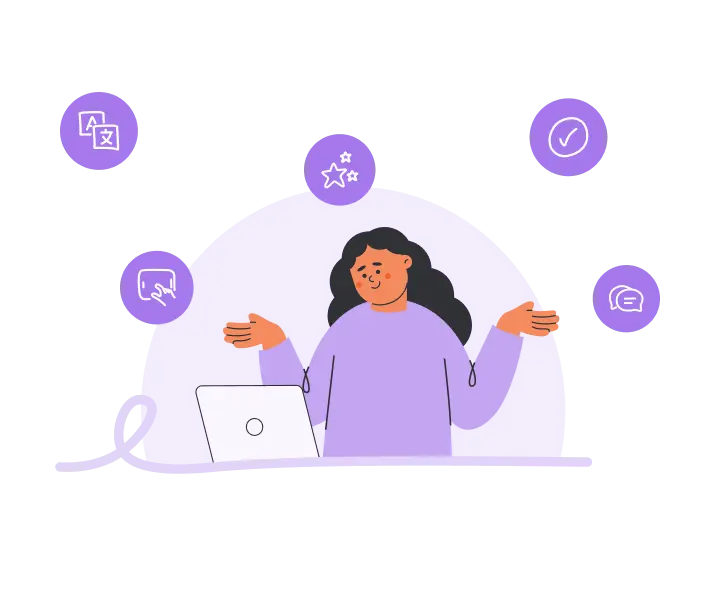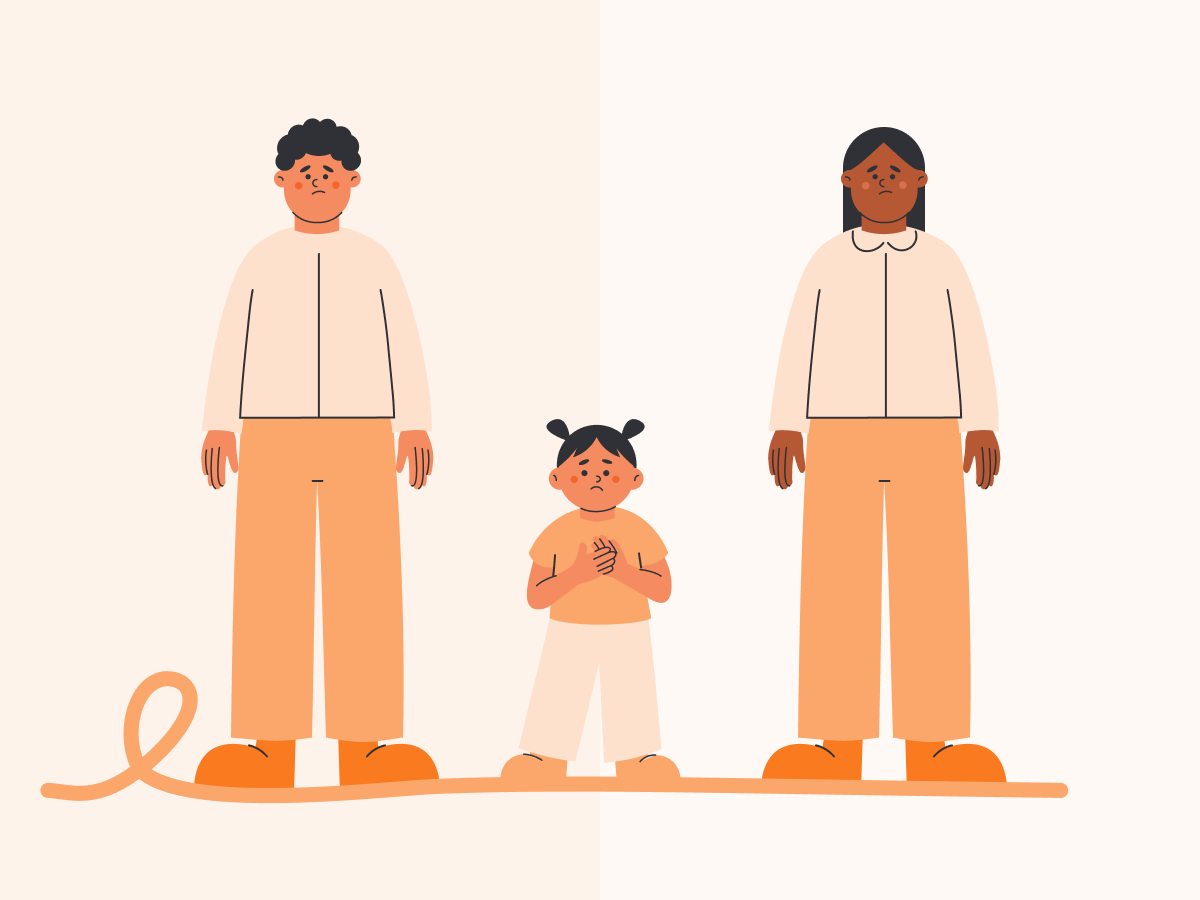settings
children
With Famly since
As Early Years educators, it's at the core of our jobs (and our hearts) to protect children from harm. So, while a parental split can be really, really tough on the children at the centre, we can still do our best to keep them happy and safe while they're in our care. Of course, it's not easy, but here are some ways you can help a child experiencing family breakdown.
Give children time to express their feelings
Big family changes will likely mean big feelings for small children (and for the adults in their lives, too). As a child’s key person, you’re a safe and familiar adult and will need to be prepared to co-regulate with them. Get ready for some changes in behaviour and be curious about what children are telling you through how they act.
Don’t forget, even older children, or those who are normally articulate, may not be able to share the complex feelings they’re experiencing.
Practical ways to help children
- Use stories to help children label their emotions and find strategies to manage them. Nursery World have created this list of age-appropriate books about parental split.
- Acknowledge and validate children’s feelings
- Make specific time for all children to practice sharing how they feel
Support the child with consistency
For many children, an Early Years setting can be a home-away-from-home, and this is especially important for children whose home life is turbulent. If you know a child in your care is experiencing familial breakdown, they are also likely to be subject to a huge amount of upheaval and change. In contrast, the familiarity of your setting can offer some much-needed security and stability.
Practical ways to help children
- Consider holding off on any big changes to your environment, like switching up your home corner
- Ensure a child’s favourite toy or resource will be available to them, in the usual place
- Maintain your normal routines as much as possible.
‘Nursery workers shouldn’t act as a counsellor, but they need to be an emotionally distant listener, a professional in their role. Parents can see that the early years practitioners are on the child’s side so there are no divided loyalties. They want what is best for the child.’
Honor Rhodes, director of strategic development at Tavistock Relationships, Nursery World: EYFS Best Practice - All about… family breakdown
The big ideas

Soften huge changes with predictability
During times of big change, such as when a family breaks down, children can struggle with feeling safe. As above, Early Years settings can be havens of predictability when a child’s life is turning upside down, so Early Years educators can support children by preparing them for any transitions and changes within the setting.
“You could produce a chart with staff members’ working days on, showing the child when they will return to the setting.”
Cath Hunter, therapeutic consultant and play therapist, Teach Early Years: Coping with Divorce
Practical ways to help children
- Prepare the child before pick-up for who will be coming to collect them, especially if there is a new routine or they’re transitioning from one parent’s home to another.
- Make use of visual timetables, now and next boards, and familiar routines
- Share a photo of how the room is set up before children arrive, to make transitions easier
Why offering choice to children matters
When you’re a child in the Early Years, it can often feel like lots of things are happening to you rather than with you. Usually, it’s things like not being able to wear your favourite wellies to bed or have ice cream for breakfast, but when it comes to family breakdown, it can be things like decisions about who you live with, and when you spend time with the people you love.
As Early Years educators, we can’t take care of those big decisions for children, but we can offer them as much autonomy as possible, where appropriate.
Practical ways to help children
- Cath Hunter recommends that educators should “provide regular opportunities to make choices wherever possible during the day – e.g. choice of fruit, toy, etc. – so the child feels in control and to build confidence.”
- Make allowances for a little more autonomy - the child wants to keep their jacket on instead of hanging it up? Let them. We want to provide consistency, but a sense of having their say can go a long way.
Don’t forget the parents
The breakdown of a family isn't only hard for the little ones - the parents separating will likely be suffering too. Cath Hunter says, “As a practitioner, it is essential that you respond positively to both parents when they collect the child, and stay detached and professional.”
“Provide both parents with opportunities to talk, either together or separately in confidence with you and your manager about the situation and any arrangements they have made that affect the child.”
Hazel Davies, NDNA early years adviser, Nursery World: EYFS Best Practice - All about… family breakdown
The more you know about what’s going on for the child, the better you can understand and support them.
Practical ways to support families
- Reassure parents that you don’t need to know any details about the break-up itself, and what they do share will be treated confidentially.
- Offer to share resources. Perhaps you have local groups you can signpost, or send them some of the links at the bottom of this article.
How Famly helps Early Years settings with split families
While you’re focusing on supporting the child at the centre of a split, Famly takes the stress of managing the admin that can come with it. ‘Limited parent access’ for parent roles in Famly means you can hide personal details from another parent and prevent split parents from using Famly to contact one another.
Parents with the ‘Limited parent access’ role cannot:
- See the other parent’s contact details, including their name, phone number, or email
- Add new contacts to the child’s profile
- Send one-on-one messages to the other parent, and vice versa
Parents with the Limited parent access role can:
- See when the other parent interacts with posts (e.g., liking or commenting) in the newsfeed
- Still have full access to child-related information.
If you’re already a Famly customer, you can access a webinar recording in Village to see this feature in action. Want to know more? Click the ‘Get a demo’ button at the top of this page.
Sources and further resources to support children during parent or carer separation
- NSPCC advice for supporting children through divorce
- Cafcass: 10 tips for parents about children and separation
- Best Practice Q&A: Supporting Separated Families
- EYFS Best Practice - All about… families after separation
- EYFS Best Practice - All about… family breakdown
- How can educators help support children through parental separation?
- Cafcass: Supporting your child through divorce and separation
- Helping children through separation
Get a personal demo now
Get a guided 1-on-1 tour of the whole platform. See what features are the best fit for you, and ask us as many questions as you like.
Book free demo










